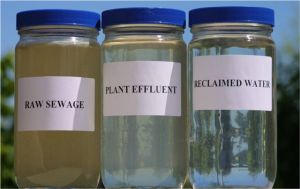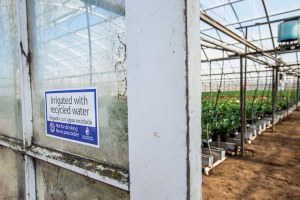One of the main resources needed by any garden, including Denver Urban Gardens‘ (DUG) community gardens, is water. Since 1985, DUG has been working in the Denver Metro area to create sustainable, food-producing community gardens, and today operates more than 155 gardens, with 30 of those located on the grounds of Denver Public Schools (DPS).

Photo Credit: Denver Urban Gardens
“School community gardens connect students, parents, teachers and the larger neighborhood community,” says Shannon Spurlock, director of public affairs and policy for DUG. “Our goal is to support the farm to school movement that introduces students to fresh, healthy, food choices that will lead them to make good food choices in the future.”
In the interest of sustainability, DPS has a long-term goal of switching all of their outdoor irrigation systems over to reclaimed water; however, an increase in the use of reclaimed water for irrigation could cause the number of school gardens to dwindle.

Photo Credit: Denver Urban Gardens
Spurlock continues, “When a school’s irrigation system switches to reclaimed water, the school can no longer run a garden.” This limitation is due to Regulation 84, a public health policy that controls the ways that reclaimed water can be used, in order to protect public health and safety in Colorado. One of the ordinances that make up Regulation 84 states that reclaimed water cannot be used on crops meant for human consumption, which includes the school gardens run by DUG.

Reclaimed Water
In Colorado, nonpotable reuse water—or reclaimed domestic wastewater that has received secondary treatment by wastewater treatment works, as well as additional treatment needed to meet standards for approved uses—is restricted to landscaping irrigation and some commercial and industrial uses. Key issues that concern the Colorado Department of Public Health and Environment (CDPHE) include the potential for bacterial and viral pathogen growth in storage and distribution systems, the development of antibiotic resistant genes and bacteria (ARG/ARB) that may be found in reclaimed water and having no clear treatment options, and the accumulation of salt due to reuse
DUG, Denver Water and WateReuse Colorado have been active proponents of amending Regulation 84 in favor of crop irrigation, as a way to make further use of a nonrenewable resource and extend the Denver Metro area water supply. DUG views the successful use of reclaimed water in other states, such as California, as an opportunity to safely increase the role of reclaimed water to agricultural irrigation, including community gardens.
“The use of reclaimed water on crops is not new,” Spurlock says. “We are benefiting from the technology and knowledge of others when it comes to food safety and security.”

Reclaimed Water Greenhouse Photo Credit: USDA
In California, crops have been irrigated with reclaimed water for 50 years. California Water Recycling Criteria allows for 43 specific uses of reclaimed water and encompasses the irrigation of all types of food crops, including those meant for human consumption. Different water quality requirements are necessary depending on how the final product will be consumed. Having a variety of treatment options supports water safety and reduces the potential for pathogens and ARG/ARB to be found in the water.
The California Ag Water Stewardship Initiative (CAWSI) addresses the issue of increased salt in reclaimed water, stressing the importance of farmers having access to water quality data that will allow them to adjust fertilization and irrigation practices accordingly for the most effective use of reclaimed water on crops.

Photo Credit: USDA
California’s success using reclaimed water for irrigation gives DUG cause to be hopeful about the future of expanded reclaimed water use in Colorado. Discussions between CDPHE and proponents of increased reclaimed water usage began in spring 2016 and are slated to continue to determine whether or not the amendment process will continue, and to ensure that public health protection remains a priority if Regulation 84 is amended.
By 2050, Colorado’s population is projected to surge from 5.4 million to 10 million people. This rate of growth places a strain on the state’s already stressed water supply, widening the gap between supply and demand, and leaving water providers searching for ways to stretch a limited resource. One possible way to meet the ever-increasing demand for water is through the use of reclaimed water, and should Regulation 84 be amended in the future, its effect may stretch beyond watering a neighborhood garden.

Photo Courtesy of Denver Urban Gardens
“Food connects our students to the land, our urban areas to rural farming, and gives everyone an opportunity to experience fresher, healthier, food that they might not experience, otherwise,” Spurlock says. “Families take what they learn in a school garden and start gardens in their own home. I have seen how growing food can have a positive influence on lives, and by amending Regulation 84 and incorporating reclaimed water into our daily lives, we can continue to have an impact.”
Watch for related coverage, including a story about water reuse and public health, in the upcoming issue of Headwaters magazine, focused on public health and water, which will hit mailboxes in early December. Not a Headwaters subscriber? Visit yourwatercolorado.org in December for the digital version. Headwaters is the flagship publication of the Colorado Foundation for Water Education and covers current events, trends and opportunities in Colorado water.

 Print
Print
Reblogged this on Coyote Gulch.